
BY NQOBANI NDLOVU
BULAWAYO residents have objected to the renaming of city streets after President Emmerson Mnangagwa, court papers filed at the High Court have revealed.
Local Government minister July Moyo recently issued a Statutory Instrument (SI) 167/20 notice announcing the renaming of streets in Bulawayo and other major cities after Mnangagwa and other living and departed heroes and heroines.
Under the SI, Mutare, Bulawayo, Bindura, Chipinge, Gweru, Kwekwe and Harare now have some streets named after Mnangagwa.
In Bulawayo, 6th Avenue and 6th Avenue Extension were renamed Emmerson Dambudzo Mnangagwa, according to SI 167/20.
But the Bulawayo Progressive Residents Association (BPRA) on Wednesday, however, filed an application at the High Court challenging the move by Moyo to rename the streets using the SI without consulting residents and other stakeholders as espoused in the Names (Alteration) Act and Urban Councils Act.
The Local Government minister and Bulawayo City Council (BCC) were cited as the first and second respondent.
“The first respondent’s actions in passing the SI 167/20, at least as far as Bulawayo is concerned, runs counter to the clear provisions of the enabling Act. Viewed through an impartial eye, such actions are, I submit, gross, eye-sore, unnatural even and illegal.
- Chamisa under fire over US$120K donation
- Mavhunga puts DeMbare into Chibuku quarterfinals
- Pension funds bet on Cabora Bassa oilfields
- Councils defy govt fire tender directive
Keep Reading
“They go against the grain of what is accepted in a normal society,” BPRA chairperson Ambrose Sibindi argued in his founding affidavit.
“The alteration of names of streets and buildings in any place is a very sensitive and personal affair which the enabling Act (Alteration of Names Act) was alive to by making it a condition precedent for consultations to take place with the owner of the land before it was done.”
Sibindi wants the court to set aside S1 167/20, arguing that it is in violation of section 4(2) of the Names (Alteration) Act arguing Moyo did not consult residents and other stakeholders as prescribed in the Act.
“Section 4(2) of the enabling Act states in clear, and in my submission, peremptory language that the first respondent shall not alter any names in terms of subsection (1) unless he has consulted the owner of the land where the alteration is to take place,” Sibindi argued.
“I am also aware … that the first respondent did not consult the second respondent about the alteration of the names. In fact, it is common cause that no consultations were made by first respondent with second respondent before first respondent came up with his imposition of the name changes.”
The Local Government ministry has not yet filed opposing papers and the court is still to set down the matter for hearing.











